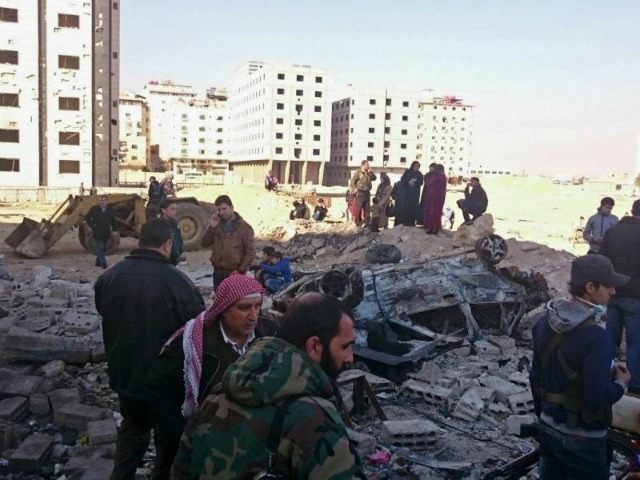The Islamic State (ISIS/ISIL) claimed it orchestrated Sunday’s triple suicide bombing that killed more than 70 people and injured at least 100 others in a Damascus suburb amid the United Nations-brokered peace talks to end Syria’s brutal civil war, which has been raging since March 2011.
ISIS claimed responsibility for the attacks in a statement circulating online from supporters of the jihadist group, reports CNN.
“A car bomb and two suicide bombers attacked the Sayeda Zeinab district, home to Syria’s holiest Shiite shrine, as representatives of Syria’s government and its divided opposition began convening in Geneva in an attempt to start the first peace talks in two years,” explains Reuters.
For Shiite Muslims, the shrine of Sayeda Zeinab is a destination of mass pilgrimage.
Quoting an Interior Ministry source, the state-run Syrian Arab News Agency (SANA) said that a group of militants had detonated a vehicle-borne bomb in the neighborhood’s Koua Sudan area, reports Al Arabiya, adding, “Two suicide bombers then blew themselves up nearby as people were being rescued.”
“Bodies were still being pulled from the wreckage,” a witness reportedly told the state-run Syrian news channel Ikhbariyah.
While SANA reports that more than 50 were killed in the attack, the U.K.-based Syrian Observatory for Human Rights (SOHR), which uses a network of ground sources to monitor the Syrian conflict, has put the death toll at 71 or more.
The Observatory reports that among the fatalities are 29 civilians, including five children, and 42 Shiite militants loyal to the Bashar al-Assad regime, backed by Shiite powerhouse Iran.
Iran-backed Shiite militants, including members of the Lebanon-based terror group Hezbollah, are fighting in Syria on behalf of Assad, along with Shiite militias from Iraq.
In the beginning of the Syrian conflict, the Sayeda Zeinab shrine area was home to heavy clashes, but the Syrian army and Hezbollah-led Shiite militias have since been secured the area.
“The shrine houses the grave of the daughter of Ali ibn Abi Taleb, the cousin of Prophet Mohammed, whom [Shiites] consider the rightful successor to the prophet. The dispute over the succession led to the major Sunni-Shiite schism in Islam,” notes Al Arabiya.
“Iraqi and Iranian Shiite militia groups that have volunteered to fight Sunni Islamist radicals in Syria in a conflict that has heavy sectarian overtones often say they are coming to Syria to defend the shrine,” it adds.
Many Shiite militias have established their headquarters near the shrine, points out Al Arabiya, citing the area’s residents.
According to the Observatory, the death toll from Sunday’s attack “is expected to rise because there are some people in critical situation.”
Syria’s nearly five-year-old civil war has killed more than 250,000 people and forced more than half (an estimated 10 million) of all Syrians to abandon their homes.
The crisis, described as the worst humanitarian crisis in recent history, has drawn in the United, States, Russia, and other world powers. It has also “caused untold suffering for Syrian men, women and children,” notes the UN.
The UN-mediated Syrian peace talks began Friday in Geneva after days of delays.
Staffan de Mistura, the UN special envoy for Syria, reportedly met with the delegation of the Saudi-backed coalition of Syrian opposition groups known as the High Negotiations Committee (HNC) in Geneva last weekend.
Meanwhile, Ramzy Ezzeldin Ramzy, the UN deputy special envoy for Syria, paid a cordial visit to the delegation of the Syrian government, headed by the permanent representative of Syria to the United Nations, Bashar Jaafari.
The Geneva meetings are expected to last six months, with Syrian government and opposition representatives sitting in separate rooms and UN officials shuttling between them. Among the immediate priorities are a broad ceasefire, humanitarian aid, and halting the ISIS threat.
The aim is to end the war with an agreement on a new governance, a new constitution, and new elections.
On Monday, de Mistura told reporters that Syrian opposition groups “are insisting, and they are not the only ones, that the Syrian people, while we are having a Syrian talks on the future of the political solution, they deserve to hear and see facts on the ground, in reduction of the violence, in the fact of the detainees, in the fact of the besieged areas.”
He added that the UN officials meeting with the HNC Monday marked the official beginning of the Geneva talks.
Early last month, The Guardian reported that up to 30,000 “residents of a Syrian town a few dozen miles from the capital, Damascus, say they are dying of starvation as a result of a months-long siege by forces loyal to the government of Bashar al-Assad.”

COMMENTS
Please let us know if you're having issues with commenting.